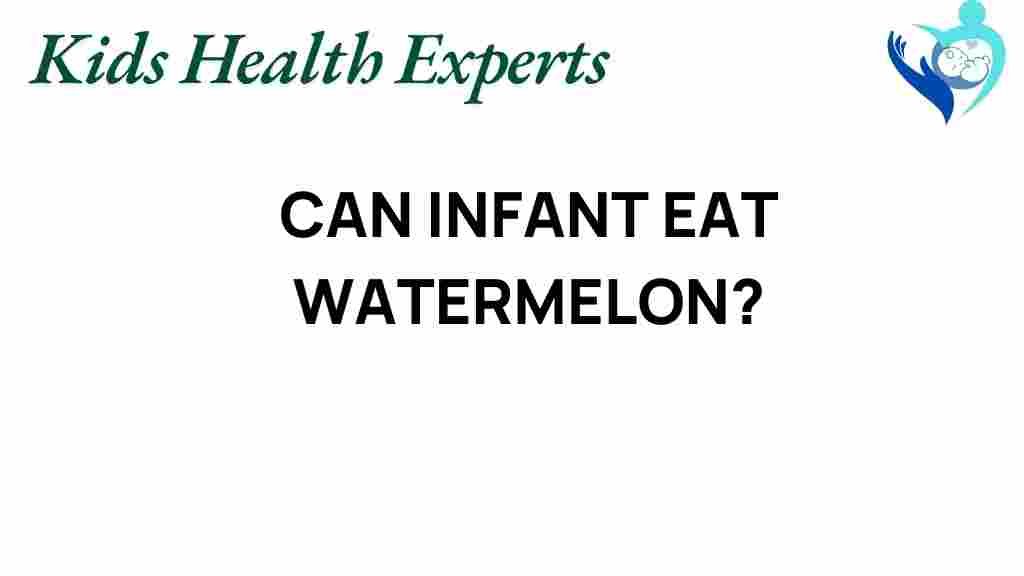Can Infants Safely Enjoy Watermelon? Unraveling the Myths
As parents, one of our primary concerns is ensuring that our infants receive the best nutrition possible. With so many fruits available, watermelon often comes up as a question mark. Can infants safely enjoy watermelon? This article delves into the myths surrounding watermelon and its suitability for infants, focusing on aspects like nutrition, food safety, allergies, and hydration.
The Nutritional Benefits of Watermelon for Infants
Watermelon is not just a delicious summer treat; it is also packed with essential nutrients that can be beneficial for infants. Here are some key nutritional benefits:
- Hydration: Watermelon has a high water content (about 92%), making it an excellent choice for hydration.
- Vitamins: It is rich in vitamins A and C, which are vital for developing the immune system and promoting healthy skin.
- Minerals: Watermelon contains potassium, which is important for heart health and maintaining proper fluid balance.
- Low Calorie: It is low in calories, making it a healthy snack option.
These nutritional benefits make watermelon a suitable addition to an infant’s diet, provided it is introduced safely and appropriately.
When Can You Introduce Watermelon into an Infant’s Diet?
Experts recommend introducing solid foods to infants around 6 months of age. However, when it comes to watermelon, timing can vary based on the individual child’s development and readiness for solid food. Here are some guidelines:
- **Age:** Watermelon can generally be introduced around 6-8 months of age.
- **Developmental Readiness:** Ensure your infant can sit up with support and shows interest in solid foods.
- **Texture Consideration:** Start with pureed watermelon or small, seedless watermelon pieces to avoid choking hazards.
How to Safely Prepare Watermelon for Infants
Preparation is key when introducing watermelon to infants. Follow these steps to ensure safety:
- Select the Right Watermelon: Choose a fresh, ripe watermelon. It should be firm and symmetrical without any bruises.
- Wash Thoroughly: Rinse the outer skin of the watermelon under running water to remove any pesticides or dirt.
- Cut and Remove Seeds: Cut the watermelon into manageable pieces and remove all seeds to prevent choking.
- Puree or Mash: For younger infants, puree or mash the watermelon to a smooth consistency. For older infants, small chunks are fine as long as they are seedless.
Addressing Common Myths About Watermelon for Infants
There are several myths surrounding watermelon and its consumption by infants. Let’s address some of them:
- Myth 1: Watermelon can cause digestive problems in infants.
- Truth: Watermelon is gentle on the stomach and can aid in digestion due to its high water content and fiber.
- Myth 2: Infants can choke on watermelon.
- Truth: If prepared correctly (seedless and cut into small pieces), the risk of choking is minimal.
- Myth 3: Watermelon is too sweet and should be avoided.
- Truth: While watermelon does have natural sugars, it is a healthy fruit choice when offered in moderation.
Potential Allergies and Reactions
While watermelon is generally safe for infants, some children may experience allergic reactions. Here’s what to watch for:
- Signs of Allergy: Look for symptoms like hives, swelling, or gastrointestinal distress after introducing watermelon.
- Consult a Pediatrician: If you have a family history of food allergies, consult your pediatrician before introducing watermelon.
Tips for Incorporating Watermelon into Your Infant’s Diet
Here are some tips to safely include watermelon in your baby’s diet:
- Start Small: Begin with small amounts to see how your infant reacts.
- Pair with Other Foods: Mix watermelon with other pureed fruits or vegetables to diversify flavors.
- Monitor Hydration: While watermelon can help with hydration, ensure your infant is still consuming breast milk or formula as their primary source of nutrition.
Hydration and Nutrition: The Role of Watermelon
Hydration is critical for infants, especially in hot weather. Watermelon can play a supportive role in keeping your baby hydrated. However, it should not replace milk, which is essential for their growth and development. Here’s how watermelon fits into the broader context of an infant’s diet:
- Complementary Food: Watermelon can be offered alongside other fruits and vegetables as part of a varied diet.
- Not a Replacement: Always prioritize breast milk or formula until your child is at least 12 months old.
Common Concerns About Feeding Watermelon to Infants
Parents might have concerns about feeding watermelon to their infants. Here are some common issues and solutions:
- Concern 1: Will watermelon upset my baby’s stomach?
- Solution: Introduce watermelon gradually and monitor for any signs of discomfort.
- Concern 2: My baby doesn’t seem to like watermelon.
- Solution: Try mixing watermelon with other flavors or offering it in different forms, like frozen watermelon cubes for teething relief.
Conclusion: Watermelon as a Safe and Nutritious Option for Infants
In conclusion, watermelon can be a safe and nutritious addition to an infant’s diet when introduced properly. With its hydrating properties and essential nutrients, it can play a role in your baby’s fruit intake. Always consider age, developmental readiness, and preparation methods to ensure safety. If you have any concerns about allergies or specific dietary needs, consulting with a pediatrician is always a wise choice.
As you navigate the exciting world of introducing solid foods to your infant, remember that the journey is unique for every child. Enjoy the process and the delightful experience of watching your baby explore new flavors and textures.
For more tips on infant nutrition, visit our nutrition guide or check out this external resource for additional information.
This article is in the category Nutrition and created by KidsHealthExperts Team
